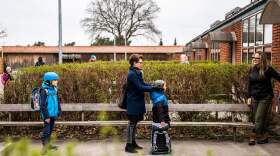
Anya Kamenetz
Anya Kamenetz is an education correspondent at NPR. She joined NPR in 2014, working as part of a new initiative to coordinate on-air and online coverage of learning. Since then the NPR Ed team has won a 2017 Edward R. Murrow Award for Innovation, and a 2015 National Award for Education Reporting for the multimedia national collaboration, the Grad Rates project.
Kamenetz is the author of several books. Her latest is The Art of Screen Time: How Your Family Can Balance Digital Media and Real Life (PublicAffairs, 2018). Her previous books touched on student loans, innovations to address cost, quality, and access in higher education, and issues of assessment and excellence: Generation Debt; DIY U: Edupunks, Edupreneurs, and the Coming Transformation of Higher Education, and The Test.
Kamenetz covered technology, innovation, sustainability, and social entrepreneurship for five years as a staff writer for Fast Company magazine. She's contributed to The New York Times, The Washington Post, New York Magazine and Slate, and appeared in documentaries shown on PBS and CNN.
-
Education Secretary Betsy DeVos is a longtime advocate of alternatives to public schools, including home schooling. The secretary has also created a grant for work-based learning programs.
-
The National Sexual Assault Hotline reports a jump in calls coming in from minors in the month of March, when many shelter-in-place orders began.
-
From shorter days to smaller classes, school will likely look radically different in the fall.
-
A growing number of colleges are facing legal complaints aimed at their response to the coronavirus pandemic.
-
In places like Uganda, and increasingly in the U.S., educators are trying text messages as a more accessible distance learning alternative.
-
Around the country, losses of educators are mounting. It's unknown whether working in schools when they were open might have exposed staff to more danger than an average workplace.
-
A new national survey also suggests most teens are following coronavirus news closely — and they're worried.
-
School leaders in New York City, Washington, D.C., and Las Vegas are abandoning the videoconferencing service after reports of meetings being disrupted by intruders.
-
After schools shut their doors in response to the coronavirus, districts raced to continue getting meals to students. Now, those efforts may be faltering.
-
Recovery will take years, and other lessons from "education in emergencies" around the world.










